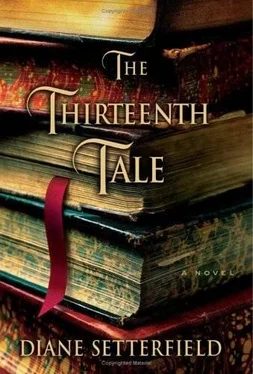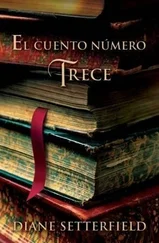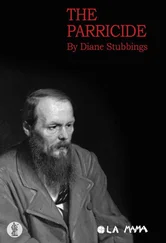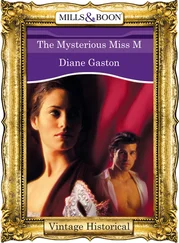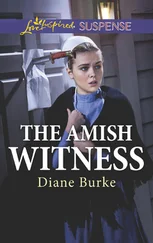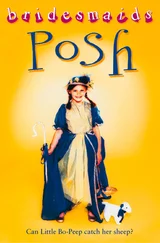Diane Setterfield - The Thirteenth Tale
Здесь есть возможность читать онлайн «Diane Setterfield - The Thirteenth Tale» весь текст электронной книги совершенно бесплатно (целиком полную версию без сокращений). В некоторых случаях можно слушать аудио, скачать через торрент в формате fb2 и присутствует краткое содержание. Жанр: Современная проза, на английском языке. Описание произведения, (предисловие) а так же отзывы посетителей доступны на портале библиотеки ЛибКат.
- Название:The Thirteenth Tale
- Автор:
- Жанр:
- Год:неизвестен
- ISBN:нет данных
- Рейтинг книги:4.5 / 5. Голосов: 2
-
Избранное:Добавить в избранное
- Отзывы:
-
Ваша оценка:
- 100
- 1
- 2
- 3
- 4
- 5
The Thirteenth Tale: краткое содержание, описание и аннотация
Предлагаем к чтению аннотацию, описание, краткое содержание или предисловие (зависит от того, что написал сам автор книги «The Thirteenth Tale»). Если вы не нашли необходимую информацию о книге — напишите в комментариях, мы постараемся отыскать её.
The Thirteenth Tale — читать онлайн бесплатно полную книгу (весь текст) целиком
Ниже представлен текст книги, разбитый по страницам. Система сохранения места последней прочитанной страницы, позволяет с удобством читать онлайн бесплатно книгу «The Thirteenth Tale», без необходимости каждый раз заново искать на чём Вы остановились. Поставьте закладку, и сможете в любой момент перейти на страницу, на которой закончили чтение.
Интервал:
Закладка:
"They've made a tent," the girl added shyly.
"I saw it,"I told her.
In the arch of the lodge gates, their mother appeared. She was slightly breathless. "Are you two all right? I saw a police car in The Street." And then to me, "What's going on?"
It was the girl who answered her. "The policemen have made a tent. You're not allowed to go near. They said we have to go home."
The blond woman raised her eyes to the site, frowning at the white tent. "Isn't that what they do when…?" She didn't complete her question in front of the children, but I knew what she meant.
"I believe that is what has happened," I said. I saw her desire to draw her children close for reassurance, but she merely adjusted the boy's scarf and brushed her daughter's hair out of her eyes.
"Come on," she told the children. "It's too cold to be outdoors, anyway. Let's go home and have cocoa."
The children darted through the lodge gates and raced into the Street. An invisible cord held them together, allowed them to swing around each other or dash in any direction, knowing the other would always be there, the length of the cord away.
I watched them and felt a horrible absence by my side. Their mother lingered next to me. "You could do with some cocoa yourself, couldn't you? You're as white as a ghost." We fell into step, following the children. "My name's Margaret," I told her. "I'm a friend of Aurelius Love."
She smiled. "I'm Karen. I look after the deer here."
"I know. Aurelius told me."
Ahead of us, the girl lunged at her brother; he veered out of reach, running into the road to escape her. "Thomas Ambrose Proctor!" my companion shouted out. "Get back on the pavement!" The name sent a jolt through me. "What did you say your son's name was?"
The boy's mother turned to me curiously.
"It's just- There was a man called Proctor who worked here years ago." "My father, Ambrose Proctor." I had to stop to think straight. "Ambrose Proctor… the boy who worked with John-the-dig-he was your father?"
"John-the-dig? Do you mean John Digence? Yes. That's who got my father the job there. It was a long time before I was born, though. My father was in his fifties when I was born."
Slowly I began walking again. "I'll accept that offer of cocoa, if you don't mind. And I've got something to show you."
I took my bookmark out of Hester's diary. Karen smiled the instant she set eyes on the photo. Her son's serious face, full of pride, beneath the brim of the helmet, his shoulders stiff, his back straight. "I remember the day he came home and said he'd put a yellow hat on. He'll be so pleased to have the picture."
"Your employer, Miss March, has she ever seen Tom?"
"Seen Tom? Of course not! There are two of them, you know, the Miss Marches. One of them was always a bit retarded, I understand, so it's the other one who runs the estate. Though she is a bit of a recluse. She hasn't been back to Angelfield since the fire. Even I've never seen her. The only contact we have is through her solicitors."
Karen stood at the stove, waiting for the milk to heat. Behind her, the view from the small window showed the garden, and beyond it, the fields where Adeline and Emmeline had once dragged Merrily's pram with the baby still in it. There could be few landscapes that had changed so little.
I needed to be careful not to say too much. Karen gave no sign of knowing that her Miss March of Angelfield was the same woman as the Miss Winter whose books I had spotted in the bookcase in the hall as I came in.
"It's just that I work for the Angelfield family," I explained. "I'm writing about their childhood here. And when I was showing your employer some photos of the house I got the impression she recognized him."
"She can't have. Unless…"
She reached for the photograph and looked at it again, then called to her son in the next room. "Tom? Tom, bring that picture from the mantelpiece, will you? The one in the silver frame."
Tom came in, carrying a photograph, his sister behind him.
"Look," Karen said to him, "the lady has got a photograph of you."
A smile of delighted surprise crept onto his face when he saw himself. "Can I keep it?" "Yes," I said. "Show Margaret the one of your granddad." He came around to my side of the table and held the framed picture out to me, shyly.
It was an old photograph of a very young man. Barely more than a boy. Eighteen, perhaps, maybe younger. He was standing by a bench with clipped yew trees in the background. I recognized the setting instantly: the topiary garden. The boy had taken off his cap, was holding it in his hand, and in my mind's eye I saw the movement he had made, sweeping his cap off with one hand, and wiping his forehead against the forearm of the other. He was tilting his head back slightly. Trying not to squint in the sun, and succeeding almost. His shirtsleeves were rolled up above the elbow, and the top button of his shirt was open, but the creases in his trousers were neatly pressed, and he had cleaned his heavy garden boots for the photo.
"Was he working there when they had the fire?"
Karen put the mugs of cocoa on the table and the children came and sat to drink it. "I think he might have gone into the army by then. He was away from Angelfield for a long time. Nearly fifteen years."
I looked closely through the grainy age of the picture to the boy's face, struck by the similarity with his grandson. He looked nice.
"You know, he never spoke much about his early days. He was a reticent man. But there are things I wish I knew. Like why he married so late. He was in his late forties when he married my mother. I can't help thinking there must have been something in his past-a heartbreak, perhaps? But you don't think to ask those questions when you're a child, and by the time I'd grown up… " She shrugged sadly. "He was a lovely man to have as a father. Patient. Kind. He'd always help me with anything. And yet now I'm an adult, I sometimes have the feeling I never really knew him."
There was another detail in the photograph that caught my eye.
"What's this?" I asked.
She leaned to look. "It's a bag. For carrying game. Pheasants mainly. You can open it flat on the ground to lay them in, and then you fasten it up around them. I don't know why it's in the picture. He was never a gamekeeper, I'm sure."
"He used to bring the twins a rabbit or a pheasant when they wanted one," I said and she looked pleased to have this fragment of her father's early life restored to her.
I thought of Aurelius and his inheritance. The bag he'd been carried in was a game bag. Of course there was a feather in it-it was used for carrying pheasants. And I thought of the scrap of paper. "Something like an A at the beginning," I remembered Aurelius saying as he held the blur of blue up to the window. "And then an S. Just here, toward the end. Of course, it's faded a bit, over the years, you have to look hard, but you can see it, can't you?" I hadn't been able to see it, but perhaps he really had. What if it was not his own name on the scrap of paper, but his father's? Ambrose.
From Karen's house I got a taxi to the solicitor's office in Banbury. I knew the address from the correspondence I had exchanged with him relating to Hester; now it was Hester again who took me to him.
The receptionist did not want to disturb Mr. Lomax when she learned I didn't have an appointment. "It is Christmas Eve, you know." But I insisted. "Tell him it's Margaret Lea, regarding Angelfield House and Miss March."
With an air that said It will make no difference, she took the message into the office; when she came out it was to tell me, rather reluctantly, to go straight in.
The young Mr. Lomax was not very young at all. He was probably about the age the old Mr. Lomax was when the twins turned up at his office wanting money for John-the-dig's funeral. He shook my hand, a curious gleam in his eye, a half-smile on his lips, and I understood that to him we were conspirators. For years he had been the only person to know the other identity of his client Miss March; he had inherited the secret from his father along with the cherry desk, the filing cabinets and the pictures on the wall. Now, after all the years of secrecy, there came another person who knew what he knew.
Читать дальшеИнтервал:
Закладка:
Похожие книги на «The Thirteenth Tale»
Представляем Вашему вниманию похожие книги на «The Thirteenth Tale» списком для выбора. Мы отобрали схожую по названию и смыслу литературу в надежде предоставить читателям больше вариантов отыскать новые, интересные, ещё непрочитанные произведения.
Обсуждение, отзывы о книге «The Thirteenth Tale» и просто собственные мнения читателей. Оставьте ваши комментарии, напишите, что Вы думаете о произведении, его смысле или главных героях. Укажите что конкретно понравилось, а что нет, и почему Вы так считаете.
